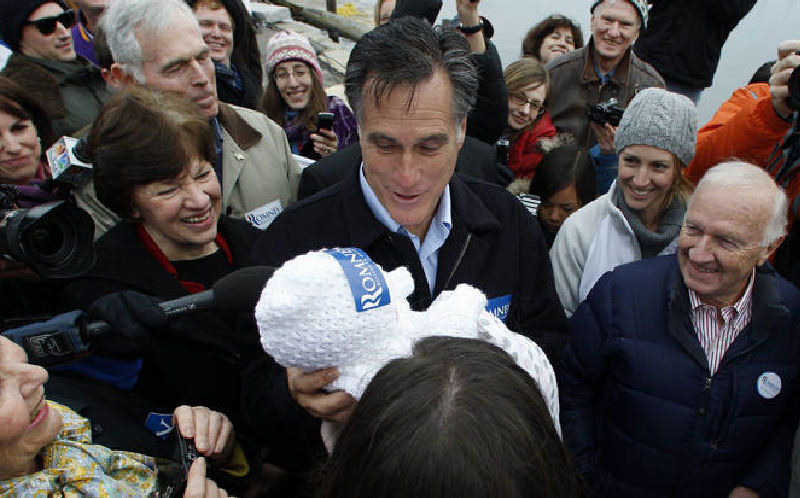DES MOINES, Iowa — Mitt Romney, watching as Republicans flail for a not-Romney alternative, is looking with optimism at Iowa, the state that rejected him four years earlier but now appears at least open to the possibility that he could be the GOP presidential nominee.
With Iowa barreling toward its lead-off caucuses Tuesday, Romney is suddenly making a public play to win the contest he largely kept at arm’s length since his stinging second-place finish in 2008. Romney planned to begin his Friday in West Des Moines with New Jersey Gov. Chris Christie, a larger-than-life figure whom conservatives courted to join the race before he endorsed Romney’s presidential quest.
Romney’s declared rivals, however, were working in overdrive to emerge as his chief rival. None went directly after the former Massachusetts governor though. Instead, they kept their focus on each other as all hoped a strong showing here could yield momentum heading into the next contests in New Hampshire and South Carolina.
“Don’t settle for what’s not good enough to save the country,” the newly ascendant Rick Santorum implored Iowans on Thursday at city hall in Coralville. He urged voters to put conservative principles above everything else and suggested that his rivals, and specifically Ron Paul, lacked them.
For the first time, Santorum, a former Pennsylvania senator who lost a bruising 2006 re-election bid, became a target.
“When he talks about fiscal conservatism, every now and then it leaves me scratching my head because he was a prolific earmarker,” Texas Gov. Rick Perry said of Santorum, referring to special spending projects members of Congress seek. “He loaded up his bill with Pennsylvania pork.'”
Rep. Michele Bachmann also criticized Santorum on the spending set-asides in a conference call late Thursday with supporters.
“He has a real problem with earmarks,” she said.
Santorum defended the practice as part of lawmakers’ constitutional role as appropriators, telling CNBC that he owed it to Pennsylvanians to bring money to the state. He said earmarking became abused and that he would support a ban on them if he were president.
Both of Santorum’s critics planned to continue to hammer that point — Perry in central Iowa and Bachmann in the western part of the state. Santorum, meanwhile, planned to campaign in north-central Iowa, including a watch party for Iowa and Oklahoma’s faceoff in the Insight Bowl football game.
The maneuvering underscored the fluid — if not convoluted — state of the GOP presidential race as Tuesday’s caucuses loom while cultural conservatives and evangelical Republicans, who make up the base of the electorate here, continue to be divided. That lack of unity could pave the way for someone who is seen as less consistently conservative.
Five days out, public and private polling show Romney and Paul in strong contention to win the caucuses, with coalitions of support cobbled together from across the Republican political spectrum and their get-out-the-vote operations — beefed up from their failed 2008 bids — at the ready. They’re the only two with the money and the organizations necessary to ensure big turnouts on Tuesday.
The three others — Santorum, Perry and Gingrich — will have to rely largely on momentum to carry supporters to precinct caucuses. Each was working to convince fickle conservatives that he alone would satisfy those who yearn for a nominee who would adhere strictly to GOP orthodoxy.
Looking to capitalize on his burst of support in new polls, Santorum made a play for tea party backers lining up behind Paul by arguing that the Texas congressman is longer on promising sweeping change than enacting it:
“The guy has passed one bill in 20 years,” Santorum said. “What makes you think he can do any of these things?”
Send questions/comments to the editors.



Comments are no longer available on this story